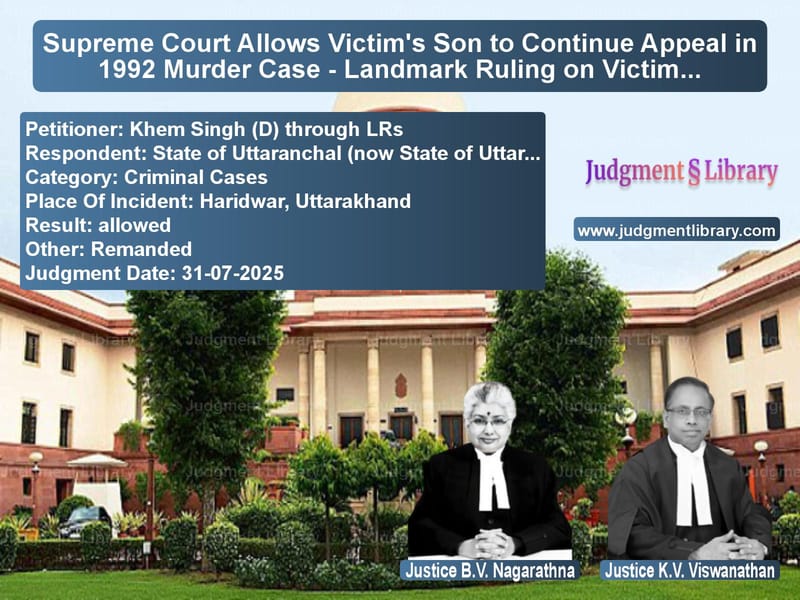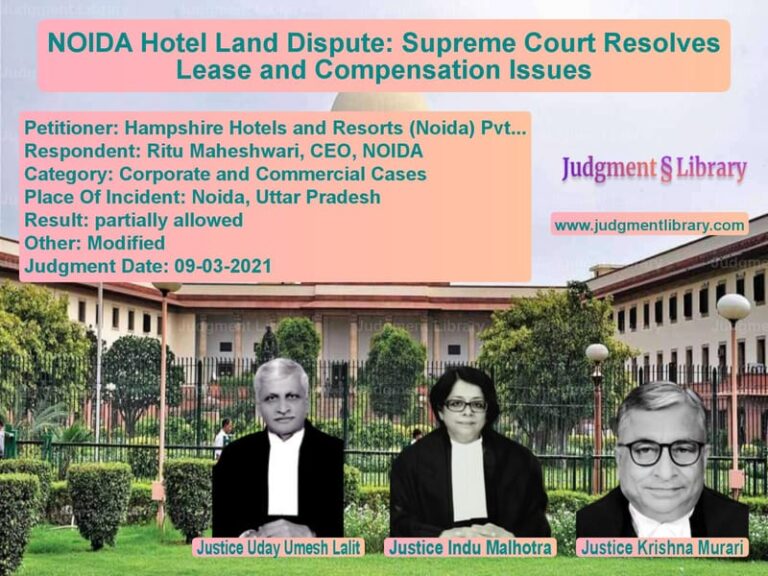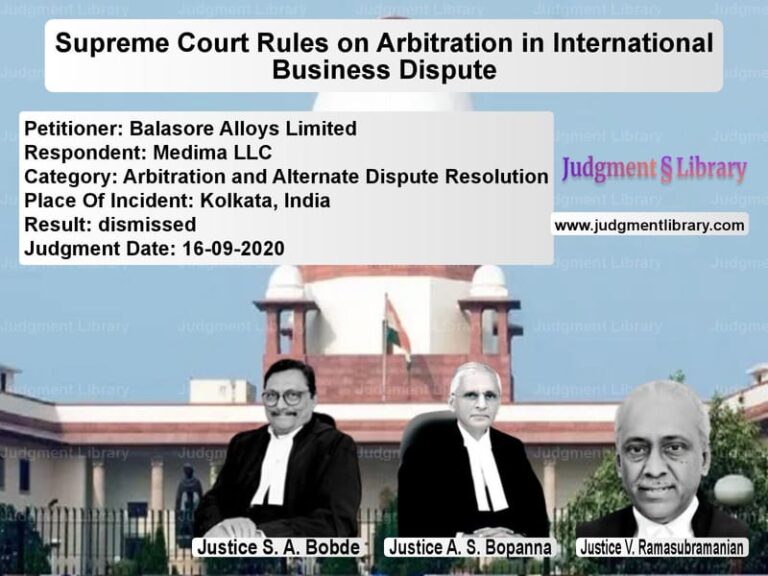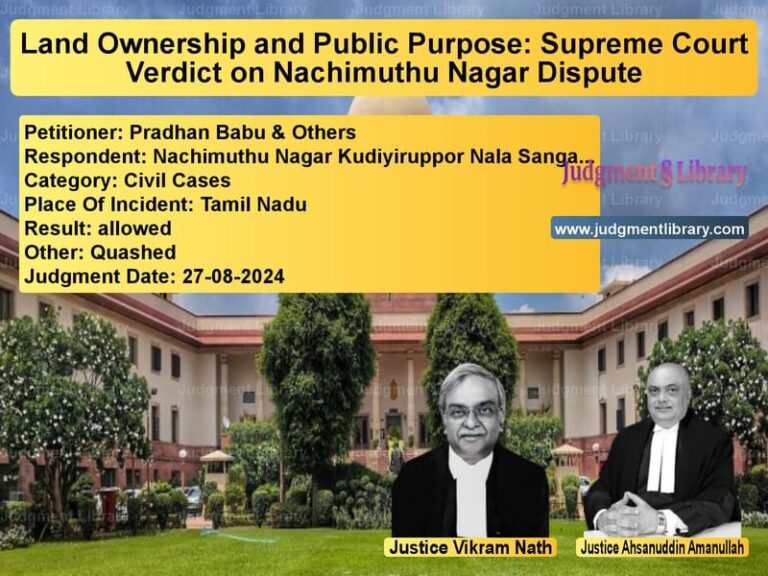Supreme Court Allows Victim’s Son to Continue Appeal in 1992 Murder Case – Landmark Ruling on Victim Rights
In a significant ruling that reinforces the rights of crime victims, the Supreme Court of India has allowed the son of a deceased victim to continue pursuing a criminal appeal against the acquittal of three accused in a 1992 murder case. The judgment, delivered on July 31, 2025, marks a crucial interpretation of victim rights under the Code of Criminal Procedure.
The case revolves around a violent incident that occurred on December 9, 1992, in Haridwar, Uttarakhand. According to the prosecution, there was long-standing enmity between two groups that culminated in a violent attack. Tara Chand (PW1), his brother Virendra Singh, and his son Khem Singh (PW3) were attacked by multiple accused using guns, sharp weapons, and bricks. The attack proved fatal for Virendra Singh, while Tara Chand and Khem Singh sustained injuries.
The prosecution alleged specific roles for each accused: Ashok (Accused No. 2) fired at Virendra Singh using a gun; Pramod (Accused No. 3) fired at Khem Singh (PW3); and Anil @ Neelu (Accused No. 4) fired at Smt. Mithilesh, wife of PW3. Following a complaint by Tara Chand, Case Crime No. 547/92 was registered at P.S. Jwalapur, District Haridwar against all accused persons.
After examining material witnesses and hearing both parties, the Sessions Court delivered its verdict on August 2-4, 2004. While acquitting other accused, the court convicted Ashok, Pramod, and Anil @ Neelu. Ashok was convicted under Section 302 IPC and sentenced to rigorous imprisonment for life with a fine of Rs. 1000. Pramod and Anil @ Neelu were convicted under Sections 302/34 IPC and similarly sentenced to life imprisonment with fines. Additional sentences were imposed under other sections.
The convicted accused appealed to the High Court of Uttarakhand at Nainital. In a common judgment dated September 12, 2012, the High Court allowed their appeals and acquitted all three accused. This acquittal prompted the original appellant Khem Singh to approach the Supreme Court through Special Leave Petitions, which were converted to Criminal Appeals Nos. 1330-1332 of 2017.
The Legal Battle Continues
During the pendency of these appeals before the Supreme Court, the original appellant Khem Singh passed away. His son, Raj Kumar, filed applications seeking setting aside of the abatement, condonation of delay, and substitution to continue the appeals. This raised fundamental questions about victim rights in criminal jurisprudence.
The applicant’s counsel argued vigorously for the right to continue the appeal. “The proviso to Section 372 of the Code of Criminal Procedure, 1973 would also include ‘the right to prosecute an appeal’. In the circumstances, the right to prosecute an appeal given to a legal heir of the victim must also be construed to extend to a case where the legal heir of the original appellant, who was also an injured victim in the instant case must be brought on record.” He emphasized that the applicant himself was an injured victim in the 1992 incident and could have filed appeals in his own right.
The counsel further contended that “the High Court, by the impugned judgment, which is a cryptic one as is evident by the manner in which the same has been written, has allowed the appeals filed by the accused and consequently acquitted them.” He stressed the significance of the case, noting that the State had not preferred any appeal against the acquittal.
Opposition from the Accused
The respondents-accused vehemently opposed the applications. Their counsel drew attention to Section 394 CrPC, arguing that “although the said provision refers to an appeal filed against a conviction, sub-section (1) of Section 394 CrPC deals with abatement of an appeal on the death of an accused when the appeal was filed under Sections 377 or 378 CrPC.”
They contended that “the expression, ‘every other appeal under this Chapter’ in sub-section (2) of Section 394 CrPC is significant inasmuch as the said sub-section lays down that apart from an appeal filed under Section 377 or Section 378 CrPC, every other appeal under the Chapter shall finally abate on the death of the appellant.” They argued that the proviso to Section 394(2) expressly deals with cases where the accused is the appellant and doesn’t extend to appeals filed by victims under the proviso to Section 372 CrPC.
Court’s Analysis of Victim Rights
The Supreme Court conducted an extensive analysis of the relevant provisions of CrPC, particularly focusing on the amendments introduced with effect from December 31, 2009. The Court noted that the definition of ‘victim’ under Section 2(wa) CrPC includes “a person who has suffered any loss or injury caused by reason of the act or omission for which the accused person has been charged and the expression ‘victim’ includes his or her guardian or legal heir.”
The proviso to Section 372 CrPC states that “the victim shall have a right to prefer an appeal against any order passed by the Court acquitting the accused or convicting for a lesser offence or imposing inadequate compensation.”
The Court made several crucial observations about the nature of victim rights. “The expression ‘victim’ has been couched in a broad manner so as to include a person who has suffered any loss or injury. The expressions ‘loss’ or ‘injury’ themselves are of a very broad import which expressions also enlarge the scope of the expression ‘victim’.”
The judgment extensively referenced the Constitution Bench decision in PSR Sadhanantham vs. Arunachalam, where it was observed that in a murder case, when an appeal against acquittal was not filed by the State but by a brother of the deceased, a private citizen could invoke the special power under Article 136 of the Constitution.
Expanded Meaning of ‘Prefer an Appeal’
One of the most significant aspects of the judgment is the Court’s interpretation of the expression ‘right to prefer an appeal’ in the proviso to Section 372 CrPC. The Court held that “the expression ‘the right to prefer an appeal’ cannot be limited to mean ‘only the filing of an appeal’. Mere filing of an appeal in the absence of prosecution of an appeal is of no avail. It does not fulfill the object with which the proviso has been added to Section 372 CrPC. Therefore, we interpret the expression ‘the right to prefer an appeal’ to also include the ‘right to prosecute an appeal’.”
The Court reasoned that “any curtailing of the legal right to prosecute an appeal on the death of an original appellant by his legal heir would make the proviso to Section 372 CrPC wholly redundant and in fact may result in a situation which is contrary to the entire object with which the Parliament had inserted the proviso to Section 372 CrPC.”
The Court further observed that “when a legal heir, who is not a complainant or an injured victim, can prefer an appeal then why not his legal heir on the death of the legal heir who had preferred the appeal be permitted to prosecute the appeal? We see no reason to curtail the right of a legal heir, who had preferred the original appeal, to be denied the right to prosecute the appeal.”
Remand to High Court
After allowing the substitution applications, the Court turned to the merits of the criminal appeals. The appellant’s counsel made a two-fold submission: first, that the High Court’s judgment was cryptic and devoid of proper reasoning; second, that even on merits, the High Court could not have rightly acquitted the accused.
The Court agreed with the first contention, noting that “the High Court ought to have considered the evidence on record in light of the arguments advanced at the bar and thereafter ascertained whether the Sessions Court was justified in passing the judgment of conviction and imposing the sentence. The same being absent in the impugned judgment, for that sole reason, we set aside the same.”
The Supreme Court emphasized the duties of an appellate court, stating that “while hearing the appeals under Section 374(2) of the CrPC, the High Court is exercising its appellate jurisdiction. There shall be independent application of mind in deciding the criminal appeal against conviction. It is the duty of an appellate court to independently evaluate the evidence presented and determine whether such evidence is credible.”
The Court set aside the High Court’s judgment and remanded the matters for fresh consideration. The accused were directed to remain on bail but were required to appear before the Principal District and Sessions Judge, Haridwar to execute fresh bonds. Given that the incident occurred in 1992 and the High Court’s order was passed in 2012, the Supreme Court requested the High Court to dispose of the appeal as expeditiously as possible.
This judgment represents a significant step forward in recognizing and protecting victim rights in the Indian criminal justice system. By allowing legal heirs to continue appeals filed by victims and interpreting victim rights expansively, the Supreme Court has ensured that the voices of victims and their families continue to be heard in the pursuit of justice, even after their demise.
Petitioner Name: Khem Singh (D) through LRs.Respondent Name: State of Uttaranchal (now State of Uttarakhand) & Another.Judgment By: Justice B.V. Nagarathna, Justice K.V. Viswanathan.Place Of Incident: Haridwar, Uttarakhand.Judgment Date: 31-07-2025.Result: allowed.
Don’t miss out on the full details! Download the complete judgment in PDF format below and gain valuable insights instantly!
Download Judgment: khem-singh-(d)-throu-vs-state-of-uttaranchal-supreme-court-of-india-judgment-dated-31-07-2025.pdf
Directly Download Judgment: Directly download this Judgment
See all petitions in Murder Cases
See all petitions in Bail and Anticipatory Bail
See all petitions in Attempt to Murder Cases
See all petitions in Custodial Deaths and Police Misconduct
See all petitions in Other Cases
See all petitions in Judgment by B.V. Nagarathna
See all petitions in Judgment by K.V. Viswanathan
See all petitions in allowed
See all petitions in Remanded
See all petitions in supreme court of India judgments July 2025
See all petitions in 2025 judgments
See all posts in Criminal Cases Category
See all allowed petitions in Criminal Cases Category
See all Dismissed petitions in Criminal Cases Category
See all partially allowed petitions in Criminal Cases Category







